The Celebrity Collector
Anita Pointer of the Pointer
Sisters has a huge
collection of black
memorabilia
By Ken Hall
Anita Pointer, lead singer
of the singing group the Pointer Sisters, has always been a fan of
flea markets, yard sales and antique shops, but it was while on a
motor trip that she decided to specialize in black memorabilia. "I
was driving with a friend from Little Rock to Prescott, Arkansas,"
she said from her home in Beverly Hills. "We stopped at a little
shop and I bought a Dancing Sam doll."
Dancing Sam is a carved
wooden figure held up by a wooden stick. A movable piece of plywood
causes his feet to dance and flail about. "What really got me was
the packaging," Pointer said with a laugh. "The box says, 'Hours and
hours of fun.' Can you imagine kids today having hours of fun
playing with a stick toy?" In any case, that toy (which cost about
$100) started a huge collection.
"I've got so much stuff, if
you spread it all out it would probably take up a basketball court,"
Pointer said. "I'm in the process of inventorying everything. Most
of my collection is bubble-wrapped and in boxes in the garage." She
had a Sotheby's representative over to appraise it not long ago. He
was so overwhelmed by it all he suggested she loan it to a museum,
or start a museum of her own!
A happy by-product of
Pointer's fame is that it's allowed her to travel the world and, in
the process, she's added to her collection from every corner.
Remarkably, black memorabilia is as big in New Zealand, England,
France and Australia (among other places she's been) as it is in the
United States. "A lot of what I've got was picked up in the flea
markets of Paris and London," Pointer said.
From Paris, for example,
she got a hair beret with a blackamoor (African-featured) figure
that looks almost Egyptian. From Australia, she bought some
"Gollywags" -- dolls with black faces and little English suits on.
And in New Zealand, she picked up a cast iron Aunt Jemima bank, a
wooden pipe holder with a black face carved on it and ceramic
figures depicting an old black couple.
"Most of the items are so
cute, even though they depict a time in our history that was not a
happy one," Pointer said. "But still, we're generally depicted as
being happy. We're usually smiling, or dancing, or shown having a
good time. I think that proves we're strong as a people. We're able
to laugh through it all. What's amazing to me is that these things
really weren't made all that long ago."
And some have a blatantly
racist slant. Like the tin of "Nigger Hair Tobacco." Or the books
titled "Ten Little Niggers" and "Little Black Sambo." Pointer even
owns a set of slave shackles. "At least that's what I think they
are," she said. "These things are hard to authenticate. I bought
them from a dealer in Los Angeles and they do match pictures of what
a slave would have been wearing."
Pointer said it's much
harder to find black memorabilia today than it was, say, twenty
years ago. "I started collecting in the early '80s, and you could
pretty much find items everywhere," she said. "Not any more. Black
memorabilia has become a very popular collectible. I know what I've
accumulated is valuable, and I've even thought about putting it on
eBay, but I just can't part with it."
So the plan for now is to
complete the inventory process (which began three years ago!) and
have cabinets built to display the items in her home. That's a
project that will doubtless keep some cabinetmaker busy for some
time. Pointer's collection literally encompasses thousands of items,
from toys to banks to cookie jars to dolls to ceramic figures to
salt and pepper shakers to quilts.
The dolls alone would
comprise a collection. There are black Kewpies, black Hawaiian dolls
with hula skirts (and no tops!), a black Raggedy Ann and Andy,
Indian dolls and even a doll made from a bottle. She's also got
jewelry (mostly costume; an example is earrings with black faces on
them), ceramic and plaster wall hangings, bottles and egg
timers.
Pointer also has water
glasses and a dinner plate from the old "Coon Chicken Inn"
restaurant, the logo for which was a black man with a huge smile on
his face. Numerous ash trays depict blackamoors. Salt and pepper
shakers often depict the classic "Mammy and Chef" combination. Most
of her figurines are ceramic or plastic.
"I have a Staffordshire
piece called 'Uncle Tom and Eve,' showing a white girl sitting on a
black man's lap," Pointer said. She also has tablecloths, many
depicting blacks dancing in the sun or on a picnic or similar
graphic. There's a wind-up "Mammy" and a set of Amos and Andy
figurines. Post cards showing blacks in an array of poses and
settings (also quite collectible) are there, too.
While on the "Ain't
Misbehavin'" tour (a celebration of the life and music of Fats
Waller), Pointer came across numerous items that now grace her
collection. One of these was a cookie jar of a Mammy with a big red
dress made of glazed ceramic (the dress is hard plastic). She has
six other cookie jars made to appear as black figures; four are
McCoy pieces, while two are made of plastic.
Pointer's favorite (and
quite possibly most valuable) piece of black memorabilia isn't old
at all, nor was it purchased at a flea market or store. It's the
sheet music from the "We Are the World" recording session, which
Anita participated in. She had the forethought to have just about
every performer and musician there (including Michael Jackson,
Quincy Jones and Tina Turner) autograph it.
Anita Pointer was born
January 23, 1948, in Oakland, Calif., one of six children by the
Rev. Elton Pointer and his wife, Sarah. Anita and her sisters --
Ruth, Bonnie and June -- would go on to become the Pointer Sisters,
one of the premiere singing acts of the '70s and '80s, with hits
that covered several genres: rock, rhythm and blues, gospel and
country. But fame didn't come easily.
The family led a
hardscrabble life. Anita got a new dress only twice a year, at
Easter and Christmas. Chances are it came from the Salvation Army or
a thrift store. The father, a devout, God-fearing Christian, was
strict: no makeup, no dancing, no movies and no rock music. But the
kids could sing before they could walk. "All we really had to make
us happy were our voices," Anita said.
The sisters honed their
vocal skills in the church choir, and it was Bonnie who first got
the idea to pursue singing as a career. She enlisted June, fresh out
of high school, and the two formed a duo called "Pointers - A Pair."
They performed at clubs in the Bay area, slowly making a name for
themselves. Before long, Anita quit her job as a legal secretary to
join the group. Ruth joined later.
But the Pointer Sisters got
off to a rocky start. They went to Texas, to find their fortune, and
instead found themselves flat broke with no way to get back home.
Out of desperation, they called David Rubinson, an associate of rock
legend Bill Graham in San Francisco. They didn't even know Rubinson;
Bonnie had merely heard of him. Luckily for the girls, he was
sympathetic to their plight.
Rubinson paid to have them
brought back to the Bay area, where he got them gigs singing backup
for acts like Taj Mahal, Grace Slick, Boz Scaggs and others. It was
Graham who signed them to a management contract.
In 1971 Jerry Wexler of
Atlantic Records heard them backing Elvin Bishop at the Whisky
A-Go-Go in Los Angeles and signed them to a record deal. Hits soon
followed.
The Pointer Sisters are
best known for songs like "Yes You Can Can," "Betcha Got a Chick on
the Side," "Fire" (by Bruce Springsteen), and "I'm So Excited" (a
song Anita wrote and which became her theme song). Along the way,
Anita won a Grammy award, has appeared on television shows such as
"Flip Wilson" and "The Carol Burnett Show" and sang in the comedy
film "Car Wash."
Today, Anita and her sister
Ruth still perform worldwide as The Pointer Sisters, along with
Ruth's daughter, Issa, 25, whose father is Dennis Edwards of the
Temptations. June and Bonnie are retired. Anita has been raising her
granddaughter, Roxie, 13, since the death earlier this year of her
daughter and Roxie's mother, Jada, who passed away in June following
a bout with adrenal cancer.
Fans of Anita Pointer may
write to the star c/o Sterling Winters Company, 10877 Wilshire
Blvd., 15th floor, Los Angeles, CA 90024.
2004
|
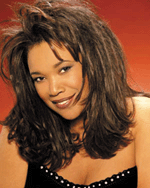
Anita
still performs worldwide with her sister Ruth and Ruth's daughter,
Issa, as the Pointer Sisters.
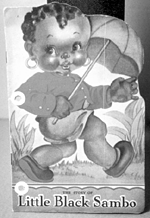
"Little Black Sambo" was an enormously popular book
in its day.
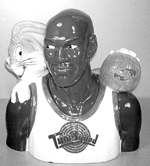
Bugs
and Michael Jordan get tight in this collectible from "Space
Jam."
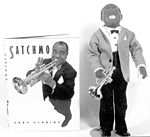
This
book and doll honor Louis "Satchmo" Armstrong.
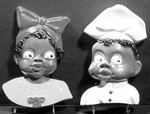
'Mammy
and chef'
ceramic wall plaques.
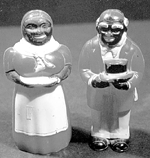
C.
'30s or '40s salt and pepper shakers.
|